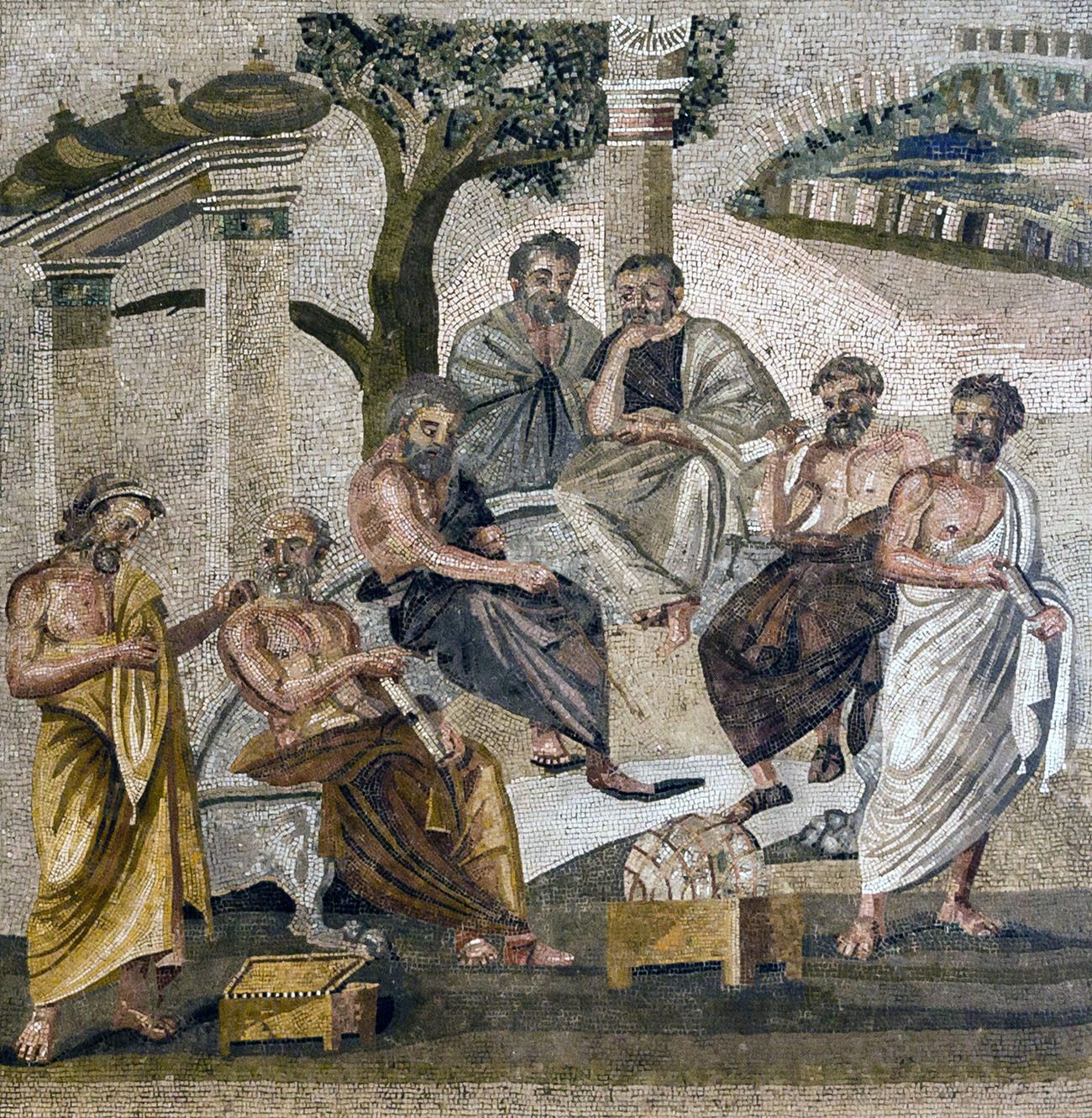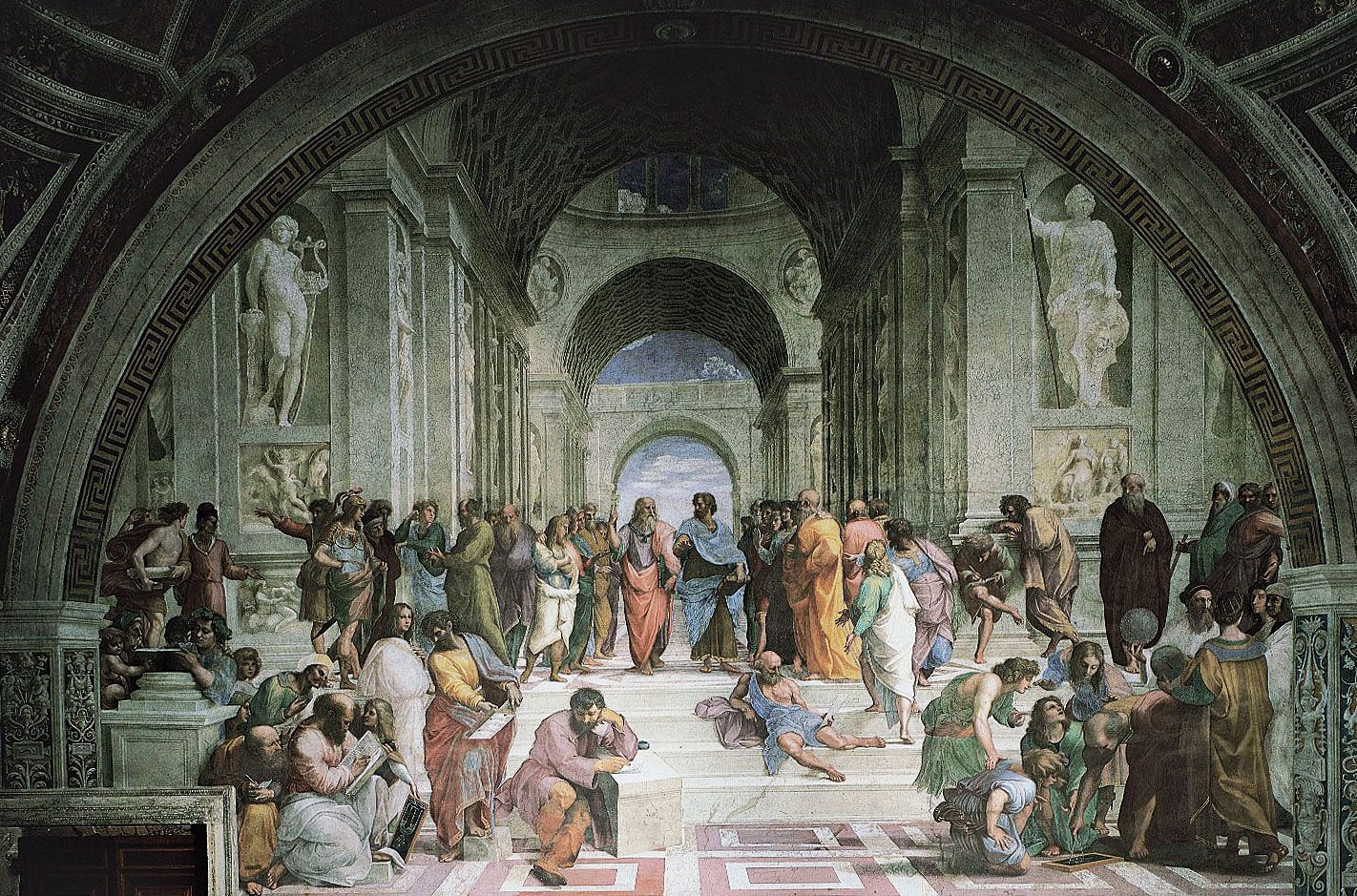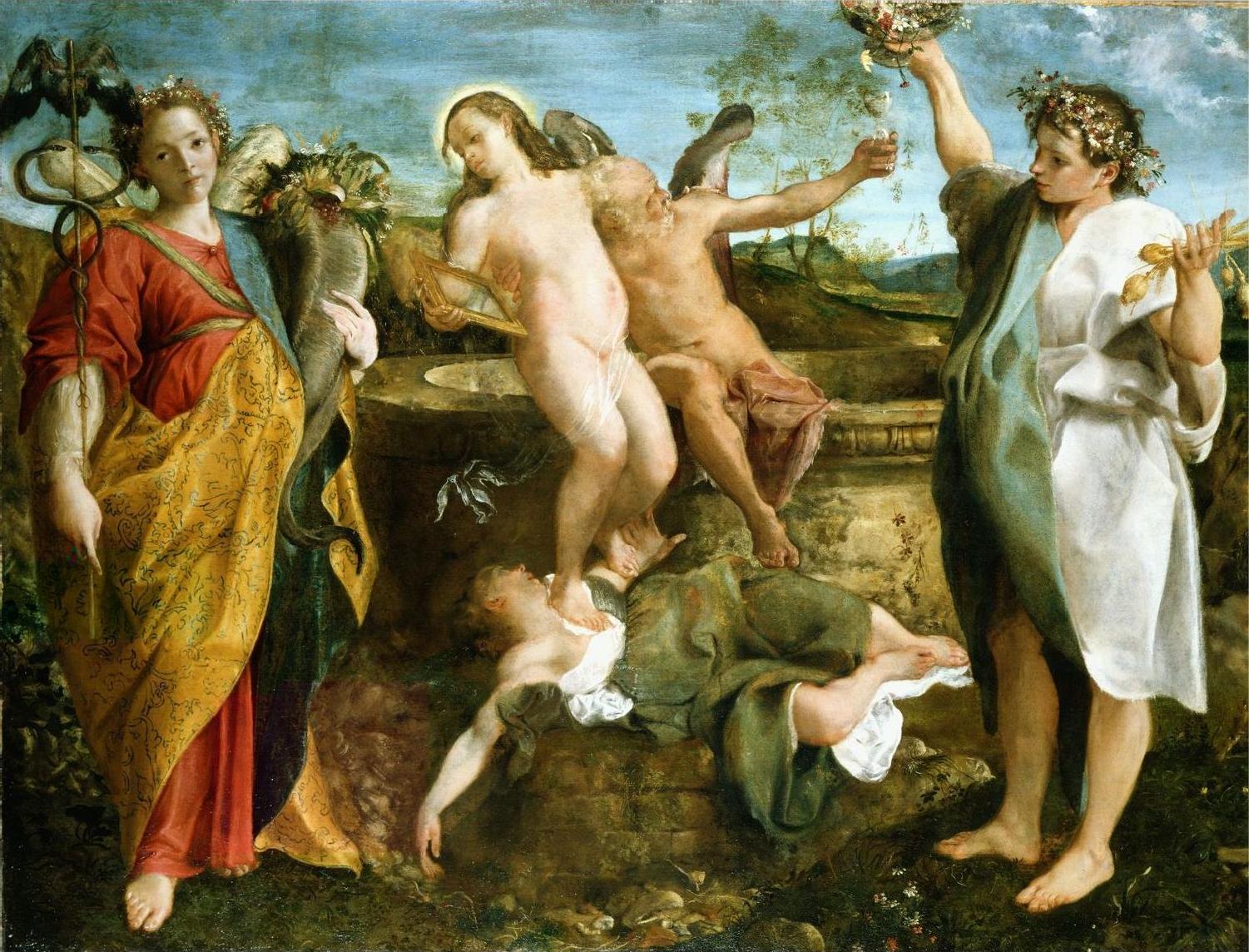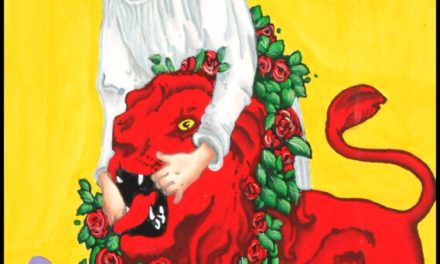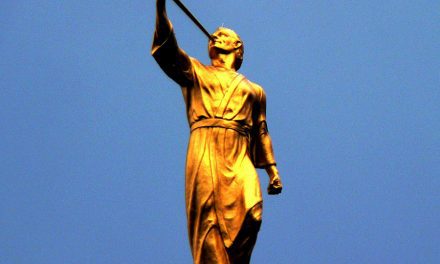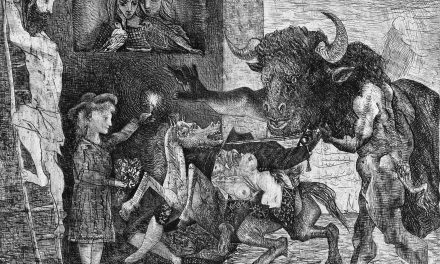Images Above: Plato’s Academy mosaic from Pompeii. Big Photo: The School of Athens by Rafael. Below: An Allegory of Truth and Time.
The Great Goddess Aletheia Is Dead! A Brief Essay on Platonic Truth & Virtue
We live in the post-modern age. What that seems to entail, at least in part, is the denial of the existence of objective truth, and the relativization of morality. It would seem that even in the hallowed sanctuaries of the Western Esoteric Traditions, some practitioners have adopted one of two unspoken consensuses: (1) That morality and “goodness” have nothing to do whatsoever with the mysteries of the occult and magic, and/or that (2) we should allow this formerly essential pre-requisite for entrance into the mysteries to become a mere afterthought regardless of our personal opinions concerning it. These unspoken consensuses are likely a result of the effort not to ruffle the feathers of any would-be practitioner or (more apropos, perhaps) potential member of an esoteric group.
Let’s start off with addressing the first of those ideologies: That morality and goodness are subjective perspectives. For some people this is a very sophisticated idea. However, much akin to the root of the word sophisticated, the premise is posited on the grounds of rhetoric, and while persuasive to those who have a vested interest or disposition toward subjectivity being true in these instances, it is based on a fundamental misunderstanding of morality and the Good. Plato adamantly rejected and refuted the Sophists of his day, who were a group of rhetoricians practicing the art of persuasion (or manipulation) which he called rhētorikē, without any notion of moral consequence or objective Truth. The sophists were feared for their ability to convince political groups and courts, thereby having the power to imprison, exile, and bankrupt anyone who met with their displeasure, such as was ultimately the case for Socrates.
Unfortunately, as a reaction to certain prevailing religious paradigms over the past several centuries, we have come to confuse a particular species of pious morality, or zeal, with Virtue. Yet virtue is and has always been one of the central tenets not only of the classical western philosophical paradigm, but perhaps more significantly the metaphysical paradigm as well. This comes to us in the western tradition principally from the works of Plato. In fact, Plato developed a philosophy of Ethics. It was posited primarily in two ideas: arete and eudaemonia, or “excellence” and “well-being” respectively. In the dialogue Meno, Plato, (by way of Socrates, the chief protagonist throughout his work) expounds a behavioral trajectory of arete or Virtue, which leads to eudaemonia or “well-being”, the overall result culminating in true happiness.
In fact, Plato developed a philosophy of Ethics. It was posited primarily in two ideas: arete and eudaemonia, or “excellence” and “well-being” respectively.
In Plato’s estimation, in order for one to achieve well-being, they must engage in this pursuit of excellence— Virtue. Yet Plato avers that the pursuit of Virtue is dependent upon the knowledge of the Good. This cultivates what he called phronesis, essentially “wisdom”, or knowing how to practically apply this knowledge in every-day life. The attainment of phronesis or practical wisdom, would eventually culminate in the pursuit of arete, which manifested as qualities such as temperance, justice, and courage; all of these sharing in some abstracted quality related to the expression of an over-arching Good. It was thought that these qualities themselves are ultimately the manifestation of arete, and culminate in eudaimonia — health, or well-being, and was considered the fulfillment of the highest possible Good. We see this again in the dialogue Phaedo, where Socrates, upon unjustly being sentenced to death or exile, chooses death by ingesting poison. His constant consolation to both himself and his grieving students and friends present with him on his deathbed, was the ideal of the Philosophic life. This ideal was elaborated at length to be nothing other than arete.
In the dialogue Phaedrus we are faced with an analogy of a charioteer attempting to steer a chariot being led in opposite directions by two horses. A black horse forcefully leads the chariot toward a descending road, and a white horse pulls toward an ascending road. We see in this analogy Plato hinting that it is in gaining control of the animal nature, which continually tries to stunt and weaken the moral inclinations of the psyche, that a person may align themselves with the archetypal “Good”, or agathon and become likened to it. Here we see an echo of the concept of the microcosm/macrocosm of Neoplatonic and Hermetic philosophy. To Plato, the Good itself was of a transcendent or archetypal nature, which imbued its quality throughout material things while simultaneously transcending them.
In the post-modern age we have witnessed the ascendancy of moral relativism. This is the belief that moral judgements are true or false only relative to some particular standpoint e.g.: the culture of a particular time or place. However, the archetypal Good transcends all such boundaries, because it is abstracted from human opinion. It is a philosophic or Platonic Ideal, informing its physical expressions, like other Ideals or “Forms” according to Plato. We might do well to re-conceptualize this Socratic or Universal type of Virtue as the study of cause-and-effect, and how as a Universal cycle of input and feedback, this manifests itself in human thought and behavior in the form of consequences. In this view we perhaps glean what Plato truly meant by insisting that a virtuous life leads to happiness— virtue is happiness. The paths are one and the same. Therefore, Plato concluded that acting in opposition to the virtuous—the Good—can therefore only result in a species of unhappiness in itself. The development of a philosophy of virtue such as was the product of Plato’s dialogues would significantly influence the later Stoic Tradition, which typically rejected the underlying transcendent metaphysics in favor of agnosticism.
In Masonry, arguably a successor to the Platonic schools of thought with a few of their professed foundations being in geometry, philosophy, and symbolism, we find that the first lesson of the Craft is morality. In fact, it is the core of what Masonry proclaims itself to be. Indeed, beyond Plato and Masonry, we find constant admonitions in the historical record toward virtue and self-control as prerequisite to all esoteric and occult work.
“Until philosophers are kings, or the kings and princes of this world have the spirit and power of philosophy … cities will never have rest from their evils,—no, nor the human race, as I believe,—and then only will this our State have a possibility of life and behold the light of day”
— The Republic
Concerning the reasoning behind these staunch admonishments to virtuous living, we may refer back to the Platonic idea elaborated in the dialogue The Republic of the Philosopher-King:
“Until philosophers are kings, or the kings and princes of this world have the spirit and power of philosophy … cities will never have rest from their evils,—no, nor the human race, as I believe,—and then only will this our State have a possibility of life and behold the light of day”
— The Republic
We find that Plato regards that the “perfected” society should be governed by a Philosopher-King. According to Plato, this sovereign should be one who has ultimately learned to govern themselves. We see all of Plato’s doctrines and ideologies synthesized into a perfected State, through its officiating personage — a ruler. The typification of this Philosopher-King perhaps lends an understanding of what Plato considered Philosophy to be. Yet it is significant to note that the wisdom espoused in the Platonic tradition is a wisdom counter-intuitive to worldly knowledge. It claims an aporia or befuddlement; confusion with what worldly personages profess to know as true. Plato’s work suggests to us that it is only a person who is no longer subservient to their lower nature, but acts in accordance always with higher Ideals, which inform but transcend materiality, that is truly capable of rising above the material inclinations that inevitably and perpetually corrode all of our societal institutions and systems.
Again, as mentioned earlier, Plato was not the only to emphasize and expound a philosophy of Virtue. Yet one of the pitfalls of post-modernism is the species of cultural amnesia, or perhaps hubris, which so often inhibits us from meeting former generations on their own terms, but rather that we constantly reinterpret their words and works through our own filters of opinion and perception. Many of Plato’s dialogues such as the Gorgias, Protagoras, and The Republic spend a significant amount of dialogue unraveling the rhetoric of the sophists, who even in his day believed truth to be subjective.
“Plato believed that there are truths to be discovered; that knowledge is possible. Moreover, he held that truth is not, as the Sophists thought, relative. Instead, it is objective; it is that which our reason, used rightly, apprehends. Through his systematic philosophy, he developed a formidable rejection of skepticism, the view that we lack knowledge in some fundamental way.”
— Lewis Vaughan, Living Philosophy
In Plato’s conception the objectivity of Truth is the reason it cannot ever be completely eradicated. It is the foundation upon which everything exists. However, it can be obfuscated. If a person be not educated in the ways of philosophy, and arete, then there was greater danger they be deceived or “persuaded” by sophistry and rhetoric. On the other hand, all knowledge according to Plato is a type of remembering. On the soul or psyche’s trajectory of metempsychosis, or reincarnation, it comes into contact with the Ideal forms such as the Good and the Virtuous, and in life remembers these forms rather than being educated in them. He calls this anamnesis. Interestingly, the Greek goddess and word for “Truth” is aletheia. This is a combination of the prefix a- meaning “not” and lethe, meaning “forgetting”. In other words, we have only to remember the Truth, because it is omnipresent and deathless.
